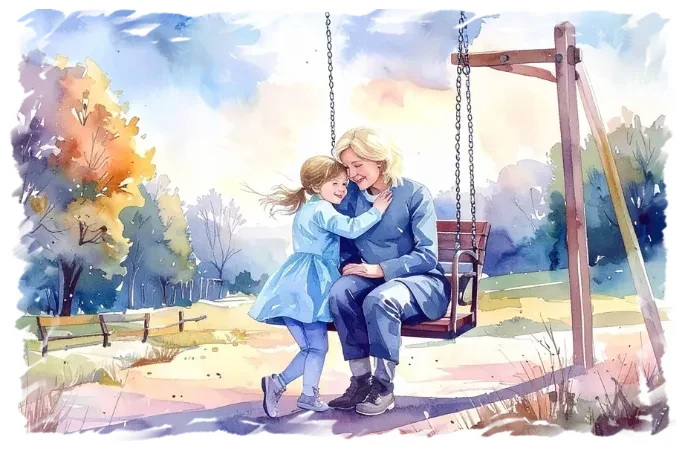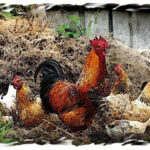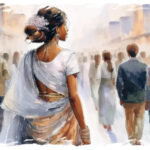Emerging from the obscurity of night, a child’s pale face, dark hair, blue eyes gazing out from the shadows of a dream. An older woman stands beside her. ‘She’s like us’, she says clearly. I awake from the depth of sleep and know my daughter is having a girl. When I tell her, she is surprised. The following night I have another dream where the same child is on a white horse galloping down a beach in Ireland. Her parents are beside her. They disappear, vanishing in the dream.
When my granddaughter is born, my daughter is intrigued. The baby is a girl, as predicted in the dream. Her skin is pale, eyes blue and almond shaped, dark hair, just like the child in the dream. She lies in her pram now, more beautiful to us than all the shimmering stars in the sky. Her smile is delicate and I feel a flutter of emotion, love. Her tiny body is swaddled in a soft blanket. Reaching forward, I pick her up as she wakes, hold her close. She nestles against me. Stroking her back, I know I am lucky. Putting her down in the pram I leave the apartment with her. The sun is shining as I walk past apartment blocks. My granddaughter looks up at me, her eyes following my face. I smile back at her, marvelling at her tiny hands, resting on the blanket. When we reach the park, I take her out and she notices everything, the trees, the sound of birds and the children in the playground. I remember the Russian grandmother with her twin grandsons in the park when my daughter was young. They were seeking a better life. Flowers open up towards the sun. The path leads up over the hill. I put my granddaughter back in the pram, and we walk towards a tree that reaches up to the sky. It’s a thousand years old, a gnarled trunk, long branches, like the tree of life, a witness to everything. A child climbs up onto the branches. He calls to another child and they meet half way.
There had been an accident the previous day. I think about this as I watch the children on the tree branches. I’d tripped and was overcome with shame at the harm I could have caused. I was holding my granddaughter. I had so much wanted to help. As a young mother I’d had little help myself. When I’d tripped from exhaustion, I held onto my granddaughter tightly. Adrenaline kicked in. I launched myself at a chair and we tumbled on to it. She started crying. I clutched her tightly and felt so ashamed. My daughter appeared. I imagined my granddaughter’s ancestors standing there. They had survived so much, war, famine, dislocation. I imagined them admonishing me. But then I imagined them saying ‘Don’t worry. You’re a good person. She’s safe now. Only bad people feel no guilt.’
I think about this when I see a friend the next day who is teaching refugees from Gaza. He talks about the devastation, the bombed buildings, the effects of trauma. I tell him I know people who are Holocaust survivors who came here only wanting peace. ‘That’s all they wanted,’ I say. ‘Peace’ He smiles at me and I see the kindness in his eyes.
*
My granddaughter is older now, a small child walking along the footpath. She pushes her scooter, laughing and pointing at a baby possum that comes out of a tree house. ‘Look he’s so cute,’ she says. ‘He’s outside. Look at his face.’
Things are getting worse in Gaza. The images of the Israeli mother and her young children taken hostage are distressing. Also the Palestinian children, maimed and dead from bombs. Back at the flat, the building alarm goes off. My granddaughter leaps into my arms whimpering like a frightened little animal.
‘Pick me up,’ my granddaughter says. I lift her high in my arms, the alarm’s siren deafening. Her father takes her and lifts her even higher.
I see her scanning our faces, desperate for reassurance, and then that night I have the dream again. She is standing on the beach with the white horse. She climbs onto the horse and gallops down the beach. Her parents are there, then they vanish.
My knee is injured in the park the next day. I am sitting there. I can’t move, can’t push my granddaughter on the swing. I remain sitting, watching as her mother pushes her high. My granddaughter turns to look at me, studying me with a smile on her face.
‘Stop’, she says. Her mother stops the swing. My granddaughter gets off. She runs over to me, flings her arms around me and says ‘Cuddle grandma.’ Then she runs off to the play equipment. Her compassion and empathy touch me deeply. I keep thinking about it. Then the next day, I tell a friend about it ‘You’re lucky,’ she says. ‘You have an empath.’
Later in the week, my daughter is tired at the park. ‘Come on grandma,’ my granddaughter calls out because I’m sitting down. She doesn’t want to leave me behind. She’s worried about it. She doesn’t care that I’m old and will slow the tribe down. She insists they don’t go until I’m okay. It’s those small things that matter. We go back to the apartment. It’s a jumble of toys on the floor. She runs around the apartment. I watch her, wondering what her life will be like, thinking about the white horse on the beach, the child who climbed up on it and galloped away. I read my Buddhist texts. You can’t control what people think about you, what they do. You can only control your own thoughts. That’s what they say. There’s an interconnectedness between everyone. The tone of the teachings is calming, grounding. I try to grasp it, understand how things are.
The following week, we go to ‘The Playground of Lost Toys’. People leave toys there they don’t want. It’s small and crowded. Everyone shares, almost like someone’s backyard. There are many children. It’s communal.
My granddaughter recognises a boy from day care. She goes up and says ‘Do you want to play?’ He grabs her hand and they run away together. She climbs up onto the first landing of the slippery dip and pretends she’s at home as we knock on the door. She runs towards us laughing. Children are innocent. Everything is play and a game with them. The sacrifice and deaths of children upsets me.
I remember my father telling me that as a child he held me up to the moon. I don’t remember him doing this but I notice the moon now.
Down at the swimming pool I feel the water soothing my aging body. Life flashes before my eyes as I think of my childhood, my grandparents, their secrets, my mother who never answered questions properly, avoided things until the questions became non-existent. And yet she also had a giving side and even my father at the end too, some kind of fatherly connection beyond the narcissism, all the hurt and lack of nurturing he went through himself. We all struggle to survive. I think of the people who lost family in wars. There are new beginnings, water rushes in the sea, like birth, life and death. I find my way out. There’s an opening in the rocks and I climb up. There’s something in the distance, a blurred image on the sand. That night I see my granddaughter on the white horse galloping down the beach, disappearing in the dream.



